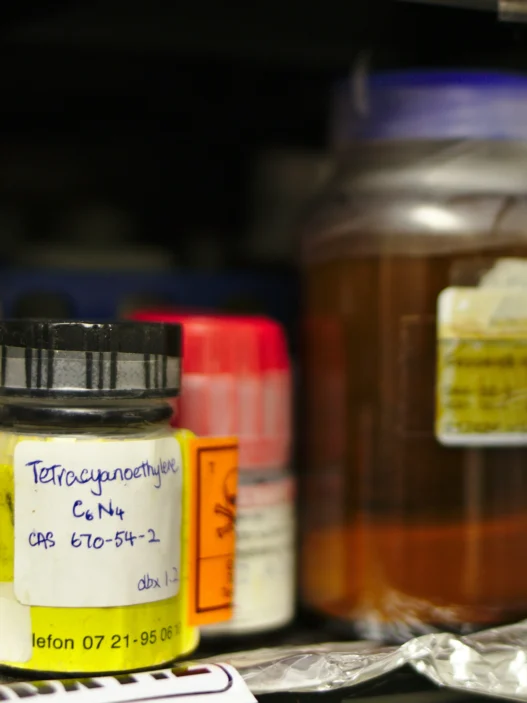Zinc sulfate, a chemical compound containing zinc and sulfate ions, plays a crucial role in various industries and applications that directly impact everyday life. It is commonly utilized in agriculture as a fertilizer to boost plant growth and improve crop yields. In addition, zinc sulfate is an essential ingredient in the manufacturing of zinc-based products, such as pigments, paints, and dyes. Furthermore, it is used in the pharmaceutical industry as a dietary supplement to treat zinc deficiency and promote overall health. Overall, zinc sulfate is a versatile compound that contributes to the advancement of agriculture, industry, and healthcare, ultimately influencing daily interactions and activities.
Table of Contents:
- 💡 Commercial Applications
- ⚗️ Chemical & Physical Properties
- 🏭 Production & Procurement
- ⚠️ Safety Considerations
- 🔬 Potential Research Directions
- 🧪 Related Compounds
💡 Commercial Applications
Zinc sulfate, a chemical compound composed of zinc, sulfate, and water molecules, has various commercial and industrial applications. One common use is as a dietary supplement in animal feed, promoting growth and enhancing overall health. Additionally, it is utilized in the production of pigments, in the manufacturing of wood preservatives, and as a component in the galvanizing process to prevent corrosion.
In the pharmaceutical industry, zinc sulfate is a vital component in various drug and medication applications. It is commonly used to treat zinc deficiency, a condition that can result in impaired growth, impaired immune function, and skin problems. Furthermore, zinc sulfate is utilized in the formulation of eye drops for the treatment of eye conditions such as conjunctivitis and eyelid inflammation. Its astringent properties make it effective in tightening the skin and reducing inflammation in topical creams and lotions.
⚗️ Chemical & Physical Properties
Zinc sulfate is a white crystalline solid with no distinct odor. It is commonly found in the form of heptahydrate crystals, which have a characteristic color and appearance.
The molar mass of Zinc sulfate is 287.56 g/mol, and its density is approximately 3.54 g/cm3. These values indicate that Zinc sulfate is much heavier and denser than common food items like sugar or salt.
Zinc sulfate has a melting point of 680 °C and a boiling point of 740 °C. These values are significantly higher than those of common food items, such as butter or chocolate, which melt at much lower temperatures.
Zinc sulfate is highly soluble in water, with a solubility of approximately 246 g/L at room temperature. It has a relatively low viscosity, making it easy to dissolve in water compared to common food items like flour or cornstarch.
🏭 Production & Procurement
Zinc sulfate is primarily produced through a chemical reaction between zinc oxide or zinc metal with sulfuric acid. This reaction results in the formation of zinc sulfate and water. The zinc sulfate produced is then typically filtered and purified to remove any impurities before it is ready for use in various industries.
Zinc sulfate can be procured from chemical suppliers or manufacturers who specialize in producing inorganic compounds. It is commonly available in the form of white crystalline powder or granules. The compound can also be found in various solution concentrations, depending on its intended use. Once procured, zinc sulfate can be transported in bulk containers, such as drums or bags, to its destination.
The transportation of zinc sulfate is typically done via road, rail, or sea freight, depending on the quantity and distance involved. Special precautions may need to be taken during transportation to ensure the compound does not come into contact with incompatible materials or conditions that could affect its stability. Additionally, proper labeling and documentation are required to comply with regulations governing the transportation of hazardous substances.
⚠️ Safety Considerations
Safety considerations for Zinc Sulfate primarily revolve around its potential harmful effects on human health and the environment. In terms of human health, Zinc Sulfate can cause irritation to the skin, eyes, and respiratory system upon contact or inhalation. Ingestion of Zinc Sulfate can lead to gastrointestinal disturbances such as nausea, vomiting, and diarrhea. Long-term exposure to high levels of Zinc Sulfate can also lead to organ damage, especially to the liver and kidneys. Therefore, proper precautionary measures should be taken when handling and using Zinc Sulfate to minimize the risk of exposure.
Hazard statements for Zinc Sulfate include “Causes skin irritation,” “Causes serious eye irritation,” and “Harmful if swallowed.” These statements indicate the potential hazards associated with exposure to Zinc Sulfate, particularly in terms of skin, eye, and digestive system irritation. It is important to adhere to safety protocols and guidelines when handling Zinc Sulfate to prevent any adverse effects on human health.
Precautionary statements for Zinc Sulfate include “Wear protective gloves/eye protection/face protection,” “IF SWALLOWED: Rinse mouth. Do NOT induce vomiting,” and “Dispose of contents/container in accordance with local/regional/national/international regulations.” These statements highlight the necessary precautions that should be taken when working with Zinc Sulfate to minimize the risk of exposure and ensure safe handling practices. Proper personal protective equipment should be worn, and proper disposal methods should be followed to prevent environmental contamination.
🔬 Potential Research Directions
One potential research direction for Zinc Sulfate is its application in crop production, particularly in improving plant growth and development. Studies could investigate the optimal concentrations and application methods of Zinc Sulfate to enhance crop yields and nutrient content in various plant species.
Another area of interest for research on Zinc Sulfate is its use in animal nutrition, specifically in addressing zinc deficiency in livestock. Investigations could focus on the efficacy of Zinc Sulfate supplementation on growth performance, immune function, and reproductive health of animals, as well as potential interactions with other nutrients in the diet.
Furthermore, research could explore the potential therapeutic benefits of Zinc Sulfate in human health, such as its role in modulating immune function, DNA synthesis, and wound healing. Clinical trials could be conducted to evaluate the effects of Zinc Sulfate supplementation on preventing or treating various health conditions, including diarrhea, respiratory infections, and skin disorders.
🧪 Related Compounds
One similar compound to Zinc Sulfate based on molecular structure is Copper Sulfate. Copper Sulfate, also known as cupric sulfate, is a chemical compound that contains copper ions bonded with sulfate ions. Like Zinc Sulfate, Copper Sulfate is commonly used in agriculture as a fungicide, herbicide, and pesticide. The molecular structure of Copper Sulfate is similar to Zinc Sulfate in that it consists of a metal ion bonded with sulfate ions.
Another compound with a molecular structure similar to Zinc Sulfate is Iron Sulfate. Iron Sulfate, also known as ferrous sulfate, is a chemical compound that contains iron ions bonded with sulfate ions. Iron Sulfate is widely used as a nutritional supplement in animal feed and as a soil amendment in agriculture. The molecular structure of Iron Sulfate is akin to Zinc Sulfate due to the presence of a metal ion bonded with sulfate ions.
Manganese Sulfate is yet another compound that shares a similar molecular structure with Zinc Sulfate. Manganese Sulfate, also known as manganous sulfate, is a chemical compound that contains manganese ions bonded with sulfate ions. Like Zinc Sulfate, Manganese Sulfate is used in agriculture as a fertilizer and as a dietary supplement. The molecular structure of Manganese Sulfate resembles that of Zinc Sulfate as both compounds consist of a metal ion bonded with sulfate ions.





